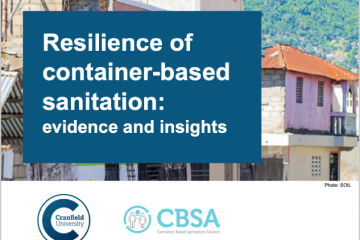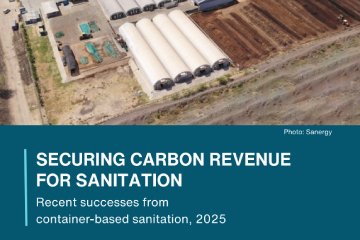With growing recognition of the significant relationship between sanitation and methane emissions, sanitation partners are calling for the scaling of existing solutions such as CBS – an approach that not only offers diverse avenues for methane mitigation but also stands resilient in the face of climate change challenges.
Sanitation is critical for action on methane

In a recent collaborative piece in the run-up to the Global Methane Forum in March, CBSA and other members of the Climate Resilient Sanitation Coalition and the Water Initiative for Net Zero (WINZ) focused attention on the critical role of sanitation in action on global methane emissions and called for urgent action, including the scaling of existing solutions such as CBS.
The piece highlighted recent research has revealed that methane emissions from wastewater management (primarily those systems using water-borne sewers) are estimated to account for a staggering 7% of global methane emissions, and the rest of sanitation for another 5%. However, methane emissions from sanitation systems are not on the radar of the climate community and are only starting to get the attention of the sanitation sector.
Good news: there are existing solutions, including CBS
The good news is there are several existing mitigation strategies for both sewered and non-sewered systems. These include methane capture, aerobic treatment technologies, the use of treated sludge in agriculture in place of synthetic soil conditioners and fertilisers and active management of non-sewered sanitation services. Container-based sanitation systems are uniquely placed to provide all these solutions.
CBS: a unique potential to tackle methane on multiple fronts
CBS systems can address methane emissions in several ways. CBS systems are actively managed, meaning waste is frequently collected and treated to reduce the anaerobic degradation that produces methane and other GHG emissions. Furthermore, because CBS systems often separate faeces from urine, they are well-suited to transforming waste into valuable reuse products. Many providers transform the waste into soil amendments such as compost and biochar with biochar having the additional potential to sequester carbon, which could offer net gains in reducing emissions. CBS providers have also used the waste to create alternative fuel, such as briquettes which can reduce reliance on unsustainably harvested firewood, thereby preventing deforestation and associated carbon emissions. And when the waste is not separated, there is potential to capture methane for use in alternative biogas fuel.
Our carbon credits feasibility study with Southpole looking at five CBS operators, found that their services would eliminate 79% to 93% of baseline emissions, depending on the treatment methods used and contextual parameters.
A win-win for mitigation and adaptation
CBS services are also robust in the face of the climate crisis. Thanks to their removable and sealable containers, CBS systems are climate resilient and can survive, function and quickly recover in the face of climate-related shocks, chronic stresses and seasonal variabilities, such as flooding and drought, to ensure that faecal matter is safely contained throughout the sanitation service chain. CBS systems also use little if any water and are thus well suited to areas facing water scarcity.
An untapped opportunity for action
Although emissions from sanitation are higher than previously estimated, this new understanding presents an untapped opportunity for additional mitigation strategies. CBS, as a system that offers multiple opportunities, can play a key role. By implementing innovative solutions and incorporating sustainable practices, we can work towards reducing the environmental impact of sanitation and creating a cleaner, healthier future for all.
Find out more, read Why Sanitation is Critical for Action Towards the Global Methane Pledge


